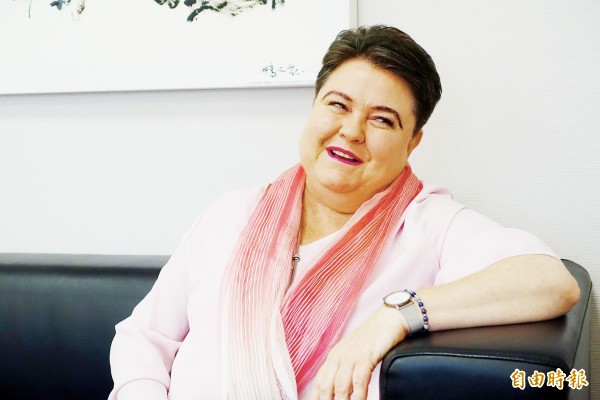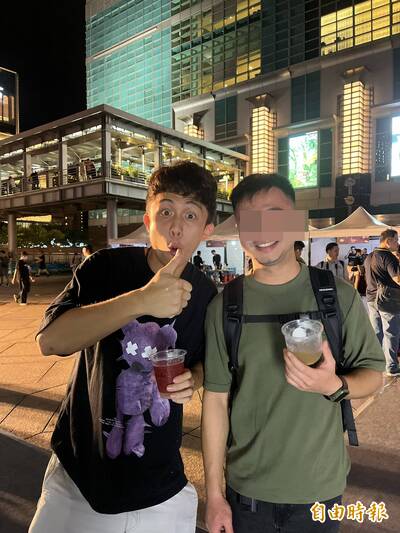《TAIPEI TIMES》 Businesses should invest ‘outside the box’: EU envoy

European Economic and Trade Office in Taiwan head Madeleine Majorenko smiles during an interview at her office in Taipei on Wednesday. Photo: Stacy Hsu, Taipei Times
This year is the 30th anniversary of the establishment of an EU-Taiwan consultation mechanism and the 15th anniversary of the founding of the European Economic and Trade Office (EETO) in Taiwan. The head of the office, Madeleine Majorenko, in an interview with ‘Taipei Times’ reporter Stacy Hsu, says Taiwanese businesses should consider the EU instead of always going for the familiar in making investments
/
Taipei Times (TT): The EU in September last year said it was prepared to begin negotiations with Taiwan on the potential signing of a bilateral investment agreement (BIA). What are the latest developments?
Madeleine Majorenko: We remain committed to an agreement with Taiwan. We are in the preparatory phase and we are learning about each other. We have done so many of these negotiations, which are important in the sense that you understand what the regulatory regime of the other side looks like. We learn from each other, we talk and we develop a view of what we can or cannot do together.
The potential agreement with Taiwan will be seen as part of a broader picture that we have. We want to build a complete architecture of agreements, so we are also negotiating with China on a BIA. Everything should fit together because the global economy today is so complicated. Every country produces different parts and if you leave one part out, there will be a hole in the puzzle.
We see Taiwan as an important player in the global value and supply chains. This is why we want to make sure Taiwan fits in the puzzle.
We are working very closely with our Taiwanese experts on understanding each other’s investment regime. Sometimes negotiations could last for five or six years, after which you have to complete the procedure, so it could be a very long process, but the more honestly and openly you do the preparatory phase, the quicker you can negotiate.
TT: Taiwan’s current foreign direct investment (FDI) to the EU accounts for only a small fraction of its total FDI outflows. How could this number be boosted?
Majorenko: I am very sad we see so little investment going from Taiwan to Europe. We are the No. 1 investor here and we see the potential in Taiwan. We are a bit sad that Taiwanese business does not feel adventurous enough. I think a lot of it is about Taiwanese business thinking Europe is complicated with many different languages and regulatory regimes, so it is easier to go to where they know the language and culture, such as China, or the US, where many have studied and people speak English.
Europe has a very big market with 500 million consumers who are very interested in the high-tech products Taiwan produces so well. We also have one whole EU market, so if you produce and sell your products in one member state market, you can sell it in all the markets under the same rule.
Do not let language barriers prevent you from coming to Europe. Do not always go for the familiar. Taiwanese companies need to reduce their dependency on traditional markets and they need to be more adventurous and think outside the box.
Taiwan has the Forward-looking Infrastructure Development Program, which is a huge project, but because we are bigger, we have exactly the same plan but with an even bigger project. Taiwan can compete and your companies are welcome here.
TT: The EETO in Taiwan has endeavored to promote people-to-people exchanges between Taiwan and the EU. Are you satisfied with the results so far?
Majorenko: We are a small office with limited resources. There is some limit to how much we can do, but I think we are really trying to push the envelope here as much as we can by reaching out and making the EU known in Taiwan.
The Taiwan European Film Festival is one thing, and the European Education Fair is another. The biggest thing we are doing is the Europe Fair, which is coming up on May 5 and May 6, and is in its third year. That has been our best effort in reaching out to the Taiwanese public, showing them that Europe is here and we are interested in Taiwan. We had 100,000 people passing by the Europe Fair last year. It was a huge success.
On the economic and trade area, almost every week we have a seminar about issues which are interesting in both Europe and here. The idea is to try to bring industries and people together. It is all about showcasing Europe in Taiwan and wishing to see more Taiwan in Europe.
TT: May 24 will mark the first anniversary of the issuance of a constitutional interpretation on same-sex marriage. At the moment, Taiwanese lawmakers remain divided on how they should legalize gay marriage. Many also worry the Central Election Commission’s passage of three referendum proposals that are unfriendly to gays could tilt the government’s position on the issue. What is your view?
Majorenko: When the Constitutional Court [Council of Grand Justices] came with its decision, we were very happy and felt it was a huge step forward for human rights in Taiwan and in the region. I know there is a bill in the Legislative Yuan which will then formalize and bring this decision forward. We are strongly in favor of the steps Taiwan is trying to take.
The referenda is an expression of the fact that in every society, not everybody agrees with everything. I accept it as an expression of democracy, but I do hope the Taiwanese government and its legal system do not do anything that goes against the Constitutional Court’s ruling. After all, the court is the highest legal body in a country.
I am not saying it is going to be easy for the government here, but a country that prides itself rightly on being a country governed by rule of law, like Taiwan, needs to balance this expression of democratic choice very carefully with the legality of different decisions.
TT: Some believe the government should move first and act more strongly on issues on which society can hardly ever reach a consensus, like same-sex marriage or the death penalty. What is your take on this?
Majorenko: I think for issues such as lesbian, gay, bisexual, and transgender (LGBT) rights, women’s rights and the abolition of the death penalty, the government needs to lead. A government needs to create an opinion and it needs to lead to create the kind of society it wants us all to live in.
We all go to the ballot box to vote for a government to put in place the kind of society they are envisaging. This government has gone to the poll envisaging, among many things, a country that is equitable where you have opportunities for everybody and where you protect the environment and human rights. It was voted into office by painting this picture.
Now, you can have a different government with a different picture. I might not agree with that picture, but it is always the government’s role to lead and say: “This is why we went to the election. You voted for us and this is where we want to take society.”
It is very difficult, but it is the only way. Otherwise, society stagnates and gets caught in old conservative thinking.
Europe has gone through exactly the same thing. If we did not have brave politicians or governments leading from the front, we would still have the death penalty and we would still be discriminating against groups of people because they are minorities, handicapped or because they have different views or sexual orientations. If you always go for the lowest common denominator, nothing will move.
TT: A few European Commission officials last month visited Taiwan to gain a better understanding of the nation’s efforts to curb illegal, unreported and unregulated (IUU) fishing. Could you tell us more?
Majorenko: When we issued the yellow card [in October 2015], we did not just issue the card and wait for something to happen. We engaged in a very detailed dialogue with our Taiwanese counterparts.
Taiwan very quickly responded by introducing three new pieces of legislation, which regulate the whole fisheries area, but what is also needed is enforcement. When my colleagues were here last month, they came to inspect on the ground, to see how the changes were happening. They discovered that everything was not perfect yet. So Taiwan still got a list, albeit shorter now, of things to do.
The next report will be delivered in September, back to the European Commission, and they will come here again to do a final inspection. I am not saying we are lifting the yellow card in September, but the shrinking of the to-do list is a good thing and things are moving in the right direction.
TT: As the EU celebrates milestones in ties with Taiwan this year, could you share with us your office’s plans?
Majorenko: My future plans are still ambitious. I want to see where we could explore areas where we could work together. When I arrived in the autumn of 2015, I did not expect at all we would be doing so much in green energy and creating a green society. I want to do more in this area because we have so much to benefit from cooperating.
Another area of focus is smart mobility, where Taiwan and the EU are working in parallel. It is also one of the things we will be talking in the Innovation Week, which is a whole week in the beginning of June where we organize 30 to 40 seminars and bring loads of businessmen here.
During that week, we are going to talk about future industries: 5G, the Internet of Things, smart mobility and artificial intelligence, among others. They are all areas where both Taiwan and the EU have strengths.
新聞來源:TAIPEI TIMES
















